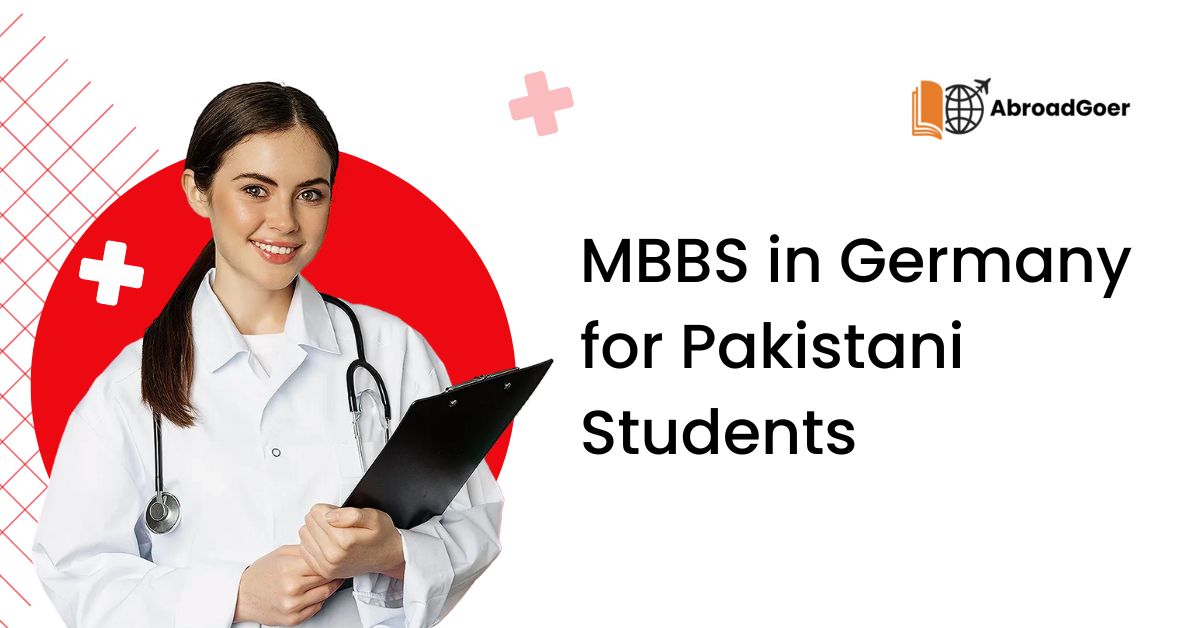MBBS in Germany for Pakistani Students
The desire to be a doctor is something that we find in many MBBS in Germany for Pakistani Students. But the dream of studying MBBS abroad follows a hefty price tag, and even getting an MBBS admission at a top medical college comes with the high cost of living and the fees. But what if there were a way to access high-quality, globally recognized medical education at a fraction of the cost, perhaps even for free? Germany, a lively country in central Europe, is becoming the solution for prospective doctors in Pakistan. Known for its strong infrastructure of culture, technology, and world-class universities, Germany is the top choice for MBBS in Germany for Pakistani students.
Well, to provide you with an in-depth overview of each including the MBBS in Germany cost for Pakistani students, detailed MBBS in Germany fees, the complex Germany university admission for Pakistani students procedure, & available MBBS scholarships for Pakistani students, and ultimately the needful MBBS in Germany for Pakistani students requirements, today’s comprehensive guide will focus on all that’s important to know on how to study MBBS in Germany for Pakistani students. We will also discuss why free MBBS in Germany for Pakistani students is a fact and how it stacks up against alternative foreign options, including MBBS in the USA for Pakistani students and MBBS in Australia for Pakistani students.
Germany is known worldwide for the quality of its education system. It has long been one of the most popular choices for Pakistani students pursuing higher education. The two most significant reasons that make MBBS in Germany no less than any other popular study destination are: the high chances of studying free MBBS in Germany for Pakistani students at public universities, and the top global rankings and reputation of German Universities.
Why Choose MBBS in Germany for Pakistani Students
Germany is among the few places where one can study medicine. Now, let’s find out why Germany is becoming a hotbed for Pakistani students to apply for the MBBS course:

- Free MBBS in Germany for Pakistani Students: This is perhaps the greatest benefit. Germany and Public universities in Germany charge low to no tuition fees for the Bachelor’s or Master’s programmes, including Medicine. Students usually only have to pay a semester fee ( lectorium / EUR 150- EUR 400). This makes the cost of MBBS in Germany much lower as compared to other countries, and perhaps it may even become the Cheapest MBBS in Europe for Pakistani students, considering only the direct tuition costs. Private Universities, though, do have high MBBS fees in Germany fees which are around €30,000 – €35,000 per annum.
- Global Recognition and Quality Education: The degree from a German Medical University is world-recognized and appreciated by medical councils all over the world, including the PMC (Pakistan Medical Commission). This gives a huge worth to your medical qualification, and you have the opportunity to explore global career prospects once you complete your MBBS in Germany. Hands-on experience, cutting-edge research, and cutting-edge medical technology are central to medical training in Germany.
- Schengen Privilege and European Exposure: A German study visa for Pakistani students allows you to visit the whole Schengen Zone. This means you can take trips to other Schengen member countries without needing additional visas during vacations, an invaluable international exposure, and cultural intelligence.
- No General University Entrance Test: Unlike very competitive medical exams like MDCAT in Pakistan, or NEET for Indian students, most German universities do not require a general entrance test for admission to the MBBS program itself (though Studienkolleg might have its test). This will make the first step of the German student visa process for Pakistani students easier.
- Healthcare System and Research Opportunities: Germany has one of the best healthcare systems in the world. If you study here, you will get exposed to the cutting-edge medical technology, research, and best practices in patient treatments, which are important for a successful medical career.
- Work Opportunities During and Post Study: International students who hold a resident permit can work part-time (up to 20 hours each week during the academic term periods and full-time during non-academic terms). You can apply for a one-year job-seeker visa after completion. It’s a good post-study work opportunity in Germany.
MBBS Course Duration in Germany
The traditional MBBS course in Germany has an average duration of six years and three months; this |coursework duration also includes a mandatory practical internship. This interdisciplinary approach provides broad-based medical education. Here is a breakdown of the stages:
- Pre-Clinical Training (2 years): This is the first stage, which deals with basic medical sciences such as Anatomy, Physiology, and Biochemistry. It is concluded by the first part of the Medical Examination, the Physikum.
- Clinical Stage (3 years): This forms the central part of your medical education; it involves practicals in hospitals across all medical subspecialties. You will accumulate hands-on medical education experiences in internal medicine, surgery, pediatrics, and other areas. The third step of medical school in Germany is capped off by part II of the State Examination (Arztliche Prufung).
- Praktisches Jahr (Practical Year – PJ) 1 year and 3 months. This final year of medical school is a full-time clinical rotation in a hospital, divided into internal medicine, surgery, and a subject of the student’s choice. It’s an immersive experience that sees you practice what you’ve learned in patient care under supervision. After having finished their PJ, students undergo the third and last part of the Staatsprüfung (State Examination) (Drittes Staatsexamen) in which they are finally awarded the license to practice medicine.
MBBS in Germany for Pakistani Students: Requirements
Fulfilling the MBBS in Germany for Pakistani students criteria is mandatory because of the tough competition and rush for MBBS in Germany, free of cost. Eligibility criteria are rigorous, especially in terms of qualification and language skills:
Academic Requirements:
For FSc Students: As the schooling system in Pakistan is 12 years, whereas in Germany it is 13 years, most of the students completing their FSc are unable to apply for the MBBS program in Germany. You will almost definitely need to participate in a foundation year program called a Studienkolleg in Germany. This course closes the gap to arrive at academic performance and is conducted completely in German. You should have secured at least 85% marks in FSc (Pre-Medical). That is a high bar, but competition is intense.
Okay, Mathematical skills are not that important since the Studienkolleg might have a math entrance exam or part of it, but I am tending to argue that they are still going to assess you for the language and math to see how overall good you are in math and English. It’s not always a hard and fast rule, but generally, a certain minimum gap of no study is better for Studienkolleg admissions. OR FSc students, if you have completed 2 years of MBBS in Pakistan with good grades, you may qualify for direct admission to German medical schools on a case-by-case basis without Studienkolleg. This stream is one that which university must be consulted directly about.
- A-Level-Holders: Applicants holding A-Levels can generally benefit from a head start and can possibly be exempted from the Studies College. You must have straight A grades in the appropriate science subjects (Physics, Chemistry, Biology). Once again, no. This is how it should be, in general, but no gap to leave in a study is preferred.
- German Language Requirements: It is the most important requirement for MBBS in Germany. The program is offered mostly in German. For Studienkolleg: German language skills at a minimum of B1 level (e.g., Goethe-Zertifikat B1). For direct MBBS in German university admission (after Studienkolleg / for A-Level students): Required minimum C1 or C2 level German language proficiency (e.g., TestDaF, DSH, Goethe-Zertifikat C1/C2). It depends on the university; there are two different ones (C1 or C2). Is it possible to do MBBS in Germany without IELTS? Yes, absolutely. As the MBBS program is conducted in German, for the medical program, usually no TOEFL or IELTS is required. The German language is the main language requirement.
- Age Group: The age of the candidate should, in general, be between 18 to 30 years.
- Financial Evidence: You need to be able to show that you have enough funds to support yourself while studying for one year. This is usually done by means of a blocked account in Germany. Right now, the needed balance is about €11,904 (as of September 2024, but it may be updated, so always check the latest amount on the German Foreign Office website or the site of the German Embassy in Pakistan). This sum will be credited to you on a monthly basis after entering Germany.
MBBS in Germany Fees and Cost of MBBS in Germany
Financial Interview: Being one of the most appealing aspects of MBBS in Germany for Pakistani students is the low cost. Here you will find the fee structure of MBBS in Germany: Let us get the fee structure of MBBS in Germany:
Government Universities: MBBS for Free in Germany: Free MBBS in Germany for Pakistani students (1)-1(Point: non-introductory)For MBBS in Germany for Pakistani students, public universities don’t charge any tuition fees to students for undergraduate and consequently, almost all postgraduate programs, including MBBS. Only some faculties in some selected universities charge an examination fee. Students have to pay a compulsory (Semesterbeitrag) Semester contribution, usually about EUR 150 to EUR 400 per semester. This fee includes administrative fees, student union fees, and in many cases, an all-semester ticket for public transportation.
This brings the total cost of studying MBBS in Germany government colleges very low, especially in comparison to private institutions or medical schools in Western countries.
Private Colleges: More MBBS in Germany. Fees: You will have a heavy burden of tuition fees if you select a private medical university in Germany. These vary between amounts of € 30,000 and € 35,000 per year. They’re not the free ones, but they are still a good education.
Living Costs: Apart from tuition/semester fees, money plays a crucial role in deciding the overall standard of living in Germany. They tend to be between EUR 700 – 1200 per month, depending on the city and your way of life.
Key expenses include:
- Accommodation: 150-350 EUR (dormitories), or 350-700 EUR (private rentals).
- Food: EUR 200-350.
- Public Transport: EUR 50-70 (frequently included in semester fee).
- Health Insurance: Compulsory, at about EUR 110-120 per month for students under 30.
- (Other Costs- Books, personal shopping, entertainment): 150-200 EUR.
The cost of MBBS in Germany (living expenses) is to be covered by the blocked account to prove that you have enough funds to support yourself in your 1st year.
To put things into perspective, when you compare study from Pakistan abroad, the fact that MBBS in Germany is free at public universities for Pakistani students makes it a prime candidate for the Cheapest MBBS in Europe for Pakistani students – especially when you consider the much higher cost of MBBS in USA for Pakistani students (often upwards of $50,000-$60,000 per annum in tuition alone plus high cost of living and needing to complete a bachelor’s degree first) or MBBS in Australia for Pakistani students (also high tuition and living costs) – meaning parents don’t have to remortgage the house to send their sons or daughters out here to study!
MBBS Scholarships For Pakistani Students
The tuition at public universities for free MBBS in Germany for Pakistani students is managed, but the MBBS scholarships for Pakistani students must also cover living costs. These German universities’ scholarships for Pakistani students may make your studies in Germany even more economical.

- DAAD Scholarship for MBBS in Germany: The German Academic Exchange Service (DAAD) is the biggest funder of international student mobility to Germany. While there are all-purpose DAAD scholarship programs for all disciplines, direct DAAD scholarships for MBBS in Germany for medical UG level studies are hard to find, or it is quite competitive. The majority of DAAD scholarships are awarded for Master’s or PhD studies. But, perhaps, it is worth checking their database for specific programs or research grants.
- Deutschland Stipendium National Scholarship Program: Leistungstalente aus dem In- und Ausland in Höhe von monatlich 300 EUR. Good students (German + foreign) at German uni will receive EUR 300/m. It is funded in part by the federal government and in part by private sponsors.
- Baden-Württemberg Scholarships: These regional scholarships are most commonly offered to exchange students or students from certain partner countries/universities.
- The Friedrich Ebert Stiftung Scholarship: This scholarship focuses on students who are politically and socially labelled with an excellent academic record in other instances.
- Erasmus+ Scholarships: ERASMUS+ is mainly meant for exchange programmes within Europe, but some scholarships are available for certain types of medical research and short programmes.
- SBW Berlin Scholarship: This scholarship is awarded to young people from the rest of the world who are socially engaged and want to pursue an academic course that applies to society.
- It is essential to make this distinction concerning fully funded MBBS scholarships for Pakistani students in Turkey or any other country, because under the German model of ‘free tuition’, tuition fee scholarships are about living expenses.
How Pakistani students can get admission to a German university
German university admission for Pakistani students for MBBS is not as easy, but if you follow step by steps, then you have better chances:
- Step 1: Learn German. Above everything else. This is non-negotiable. Join a well-known German language academy in Pakistan (e.g., the Goethe-Institut Pakistan).Try scoring for at least B1 for Studienkolleg entry, and C1/C2 for direct entry at university. Sow early, because this is a project that requires a lot of time and effort.
- Step 2: Educational Preparation & Attestation of Documents Ensure that your FSc/A-Level result is as high as it possibly can be (85 %+ for FSc, straight As for A-Levels). Get all your degree papers attested/verified officially from the concerned board in Pakistan and later from the German Embassy/Consulate in Germany. This is very important for MBBS in Germany for Pakistani students. Apply to Studienkolleg (for FSc Students). If you are studying FSc, then research and apply to the M-Course Studienkolleg programs of medical sciences.
- Often, you must pass an entrance exam (Aufnahmetest) in German, including tests in the German language (sep. natural science, Mathematics).
- Applied for university
- For A-Level students or FSc students after finishing Studienkolleg: Apply to your desired German universities directly offering MBBS. Uni-assist is also used by many universities. de for foreign patent applications. Some may have their application portals.
- Send in a complete application form (link to form), certified copies of academic certificates (originals will be required to be presented to the employer during contract signing) , certificates or proof of German knowledge (level C 1/C2), Curriculum Vitae in tabular form, motivation letter, and documents asked by the specific university. Although this requirement is becoming increasingly outdated, you’ll also need to pay an application fee (often around EUR 50-150).
- Step 5: Get the Admission Letter. If you are accepted, you will receive a formal admission letter from the university. This is a vital document for your visa application.
- 6th Step: Financial Planning - Blocked Account Open a blocked account in Germany and pay in the necessary subsistence. amount (currently €11,904). This bank statement is crucial evidence of funds for your visa..
The Process of Getting The German Study Visa for Pakistan
Applying for the German study visa from Pakistan is the next important step after you have received your university admission letter. Some professional consultants can make a big difference. The following documents are required to obtain the visa:
- Completed German national visa application form (available online).
- To Passport ( with a Minimum of 6 months’ Validity).
- Biometric passport-size Photos.
- University Admission Letter and its copy.
- Proof of funds: The best option is to send the confirmation of the blocked account.
- Proof of Health Insurance: For the first few weeks until you can obtain German public health insurance.
- Accommodation Proof: Confirmation of residence hall accommodation or lease.
- Flight Itinerary (pre-booking).
- Police Clearance Certificate(PCC).
- Medical Certificate.
- Testimonial of Study Certificates (originals and Xerox).
- German Language Certificates (originals and photocopies).
- Curriculum Vitae (CV).
- Proof of reason for application (explaining why you wish to study in Germany).
- Visa Application Submission: Make an appointment with the German Embassy in Islamabad or the German Consulate General in Karachi online.
Appear in person on the date provided to apply/submit your documents and biometrics. You might also be interviewed, somewhat briefly.
Processing Time And The Success Rate Of The VISA:
How long does it take to get a student visa for Germany from Pakistan? It can take 1 to 3 months to process a German student visa from Pakistan. You need to apply early.
The Germany student visa approval rate for Pakistani students is medium to high, provided all documents are correct and requirements are met fully.
Cheapest MBBS in Europe for Pakistani Students vs. Other Global Options
While going to study MBBS abroad, a question arises in the minds of Pakistani students regarding the consideration of destinations. Now, let us compare MBBS in Germany with other Top destinations:
- MBBS in the USA for Pakistani students: Very costly, mostly; they need a pre-med bachelor’s to apply for medical school (which is MD). Tuition may hover around $50,000-$80,000 or more per year, along with hefty living expenses.
- MBBS in Australia for Pakistani students: Just like in the USA, the majority of medical programmes in Australia are extremely expensive, costing anywhere between CAD 60,000-80,000+ yearly.
- Fully funded MBBS scholarships for Pakistani students in Turkey: Turkey is emerging as a popular destination and provides some scholarships. But there are tuition fees, and fully-funded scholarships are brutally competitive and small. It is cheaper than in the States or Australia, for example, but not in general “free” like the public universities in Germany.
- MBBS in Germany: For public universities, tuition is virtually free, and so the cost of MBBS in Germany is much less compared to the US, Australia, or even a few other European countries, making it the Cheapest MBBS in Europe for Pakistani students, even when comparing with their tuition only. The biggest investment is in the job training and learning a bit of German, and the cost of living.
This cost-benefit is a strong enough incentive for Pakistani students to fulfill the daunting German linguistic requirements and Studienkolleg if obligatory.





